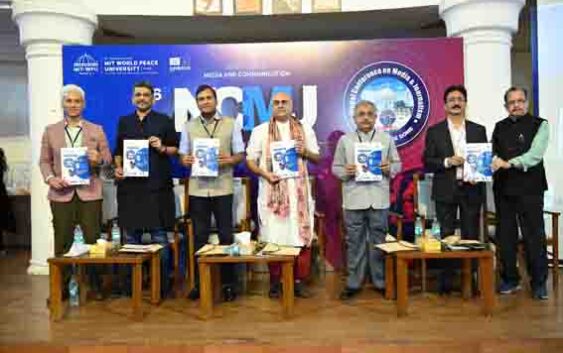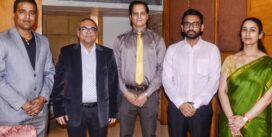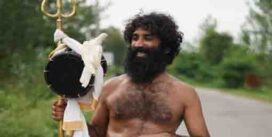- आकाश एजुकेशनल सर्विसेज लिमिटेड ने एस्पायरिंग इंजीनियर्स के लिए पेश किया “आकाश इनविक्टस”– अल्टीमेट JEE प्रिपरेशन प्रोग्राम
- Beyond Key Celebrated Women’s Day 2025 Across All its Offices
- Prasar Bharati and Eros Universe’s Eros Now Announce Strategic Collaboration to Enhance Digital Content Delivery
- Three Stars, a Cricket Match, and One Life-Changing Story: ‘TEST’ Premieres April 4
- Netflix Becomes the Exclusive Home for WWE in India Starting April 1
Power and Impact of Movie Theatres Cannot Be Duplicated: Actor Rajit Kapur on OTT Disruption at MIT-World Peace University Conference

· He was speaking at the sixth National Conference on Media and Journalism (NCMJ), organized by the Department of Media and Communication at MIT World Peace University.
Pune: Amid growing concerns about the relevance of movie theatres, as more people gravitate toward OTT platforms, celebrated actor and director Rajit Kapur emphasized that the power and impact of movie theatres cannot be replicated, despite advancements in technology.
Renowned for his performances in Byomkesh Bakshi, the acclaimed films Suraj Ka Satvan Ghoda and The Making of the Mahatma, where he portrayed Mahatma Gandhi, Kapur shared his insights at the 6th edition of the National Conference on Media and Journalism (NCMJ), organized by the Department of Media and Communication at MIT World Peace University (MIT-WPU).
In his interactive session with students at MIT World Peace University, the veteran actor stressed the importance of movie theatres in the era of digital disruption caused by social media and OTT platforms.
He said, “In the movie theatre, you are allowing yourself to immerse in a space and letting that content, that story, that scene, overpower you, envelop you, involve you, take you in, and suck you in. And that you can’t get from an iPad, a screen monitor, or a phone; I think we have to understand that. I also watch content on OTT platforms, but I just love the thought of going to the theatre and being immersed and enveloped in that story, so you come out of it. It’s an experience. The power and impact of movie theatres cannot be duplicated, despite our progress in technology.”
The celebrated actor and director also discussed the growing influence of social media on young minds and the concerns surrounding it. He said that social media has become deeply ingrained in our lives today, and he acknowledged the concerns associated with it, making it essential to consider our responsibilities.
“While I fully support freedom of speech and expression, we must also acknowledge our social responsibility when we engage online. It’s not just about the filters we apply to our photos—what about the filters in our minds? People often post without considering the consequences of their words. Freedom of speech carries weight, especially when social media is literally in the palm of your hand. You must be mindful of what you share because every action has a reaction. Unfortunately, we sometimes lose sight of this balance. You, the youth, are the foundation of this country. Your actions, reactions, and mindset will shape the future of our nation. You are tomorrow, so please think carefully about the future you want and how you plan to shape it with the choices you make today,” he added.
Themed “Media and Society: The Emerging Landscape,” this flagship event focused on the evolving relationship between media and society, with discussions on the opportunities and challenges shaping the future of journalism.
The event began with an inspiring keynote speech from Prof. Dhiraj Singh, Associate Dean of the Department of Media and Communication. His address centered on the role of artificial intelligence in media, the influence of journalism in peacebuilding, and the future of digital cinema.
The inaugural program also featured industry veterans like Ravi Capoor, former CEO of Sansad TV, Suneet Bhave, President of the Pune Union of Working Journalists, and Siddharth Kak, renowned television producer and documentary filmmaker.
The event offered an enriching experience for students, featuring plenary sessions that delved into various aspects of media. One of the key sessions was “Media & Journalists as Peacemakers.” Another session was “The Art of Storytelling and Persuasion,” where journalists and communication professionals participated in thoughtful discussions.
Prof. (Dr.) R. M. Chitnis, Vice Chancellor of MIT-WPU, highlighted the growing importance of AI in media, urging future media professionals to adopt these technologies while maintaining ethical journalistic standards.
In his address, Siddharth Kak emphasized the responsibility of content creators, saying, “In today’s digital age, the power of storytelling lies in creativity and authenticity. We must always strive for truth in our narratives and be responsible for what we create.”
Rahul V. Karad, Executive President of MIT-WPU, concluded the conference with a powerful message, stating, “Media has the power to shape society’s future. As students and professionals, we must ensure we use this power responsibly, focusing on truth, transparency, and the betterment of society. This conference has shown how vital it is to engage with the world in thoughtful and meaningful ways.”
The conference was supported by key partners, including the Pune Union of Working Journalists, the R.K. Laxman Museum, and the Foreign Correspondents’ Club of South Asia, bringing diverse perspectives into the conversation on media’s societal impact. It provided an invaluable platform for students, educators, and professionals to engage in dynamic discussions through panel sessions, fireside chats, and interactive workshops, reinforcing the crucial role of media in today’s rapidly changing world.


